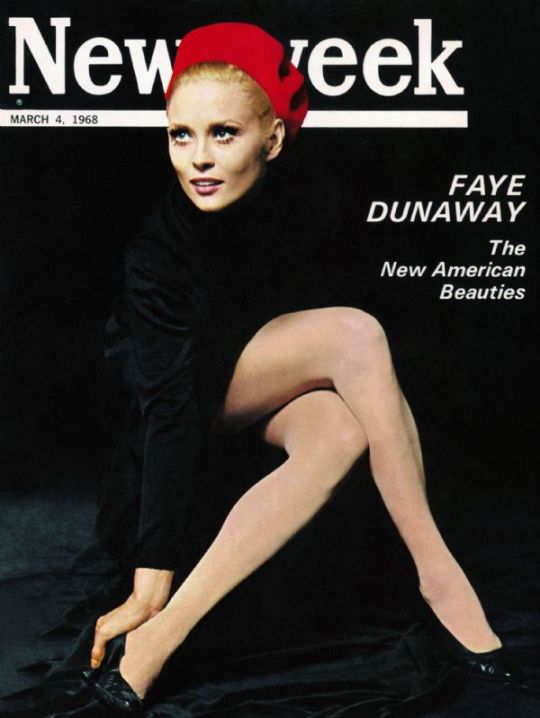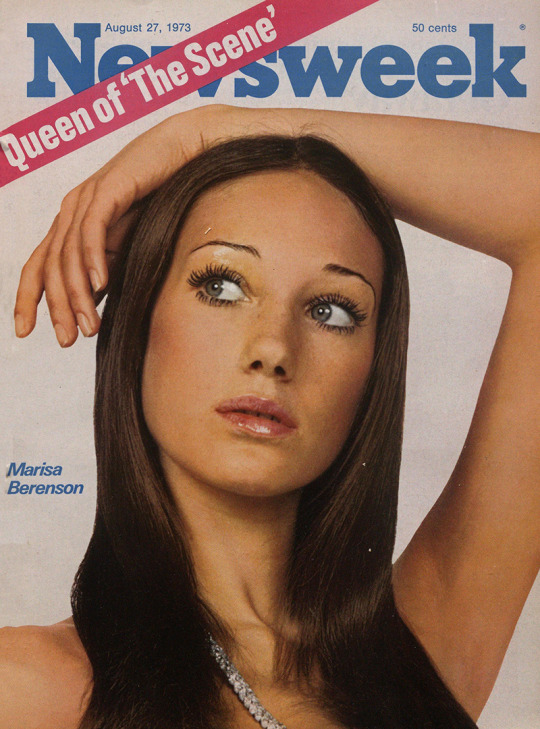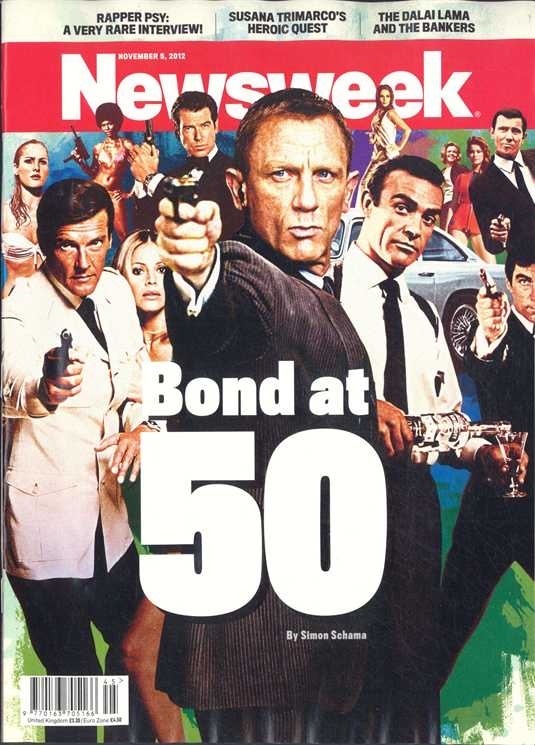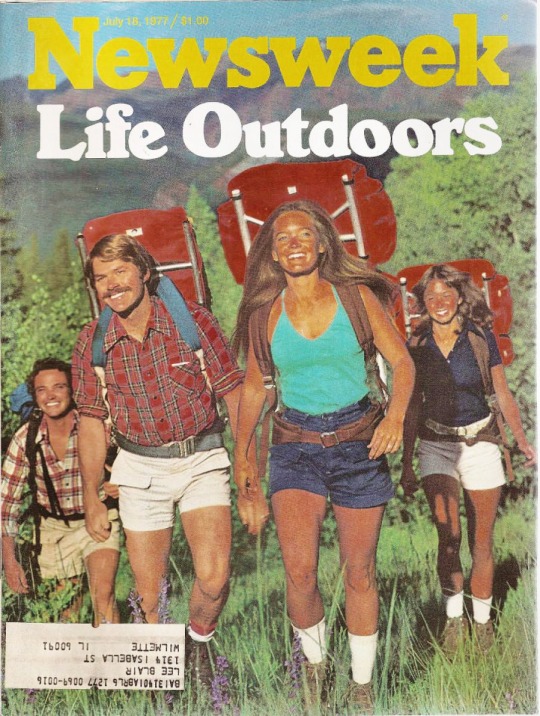#Newsweek Magazine
Text

The first issue of Newsweek magazine was dated February 17, 1933 #OnThisDay
12 notes
·
View notes
Text

COVER GIRL -- IT GIRL -- RET HAT GIRL.
PIC INFO: Part 2 of 2 -- Spotlight on American theatre/film actress Faye Dunaway on the March 4th, 1968 cover of "NEWSWEEK" magazine, photographed by her then fiancé Jerry Schatzberg in NYC, c. early 1968.
Source: https://kinoimages.wordpress.com/2012/08/05/faye-dunaway-by-jerry-schatzberg.
#Faye Dunaway#Faye Dunaway 1968#SFAE#San Francisco Art Exchange#Jerry Schatzberg#Jerry Schatzberg 1968#Jerry Schatzberg photography#Actress#Sixties#Modeling#Photosession#NYC#Newsweek Magazine#Photoshoot#60s#New Hollywood#Newsweek 1968#Newsweek Magazine 1968#Magazines#American Style#American Actress#New Hollywood Movement#60s fashion#60s glamour#60s Style#Photography
2 notes
·
View notes
Text

14 notes
·
View notes
Text

Gluekit for Newsweek, March 24 2023
Cover story: "How women entrepreneurs are creating new businesses in record numbers" by Kerri Anne Renzulli (link)
#Gluekit#cover illustration#Newsweek magazine#female entrepreneurs#female founders#editorial illustration#2023
8 notes
·
View notes
Text
I Lost White Friends When I Finally Spoke Out
— Leron L. Barton | Wednesday July 26, 2023

LeRon L. Barton (Pictured) tells Newsweek about the racist experiences he has had with his white friends over the years. Courtesy: LeRon L. Barton
Having friendships with different types of people is a wonderful concept. To learn, trade ideas, have great experiences, and grow with folks from all kinds of backgrounds is a goal that I have always wanted to achieve.
As someone who loves gaining knowledge and immersing myself in various customs, it's essential for me to expand my social circle. I have friends who are Black like myself, Chinese, Filipino, Mexican, Italian, Salvadoran, Irish, Indigenous, and Arab. We discuss politics, food, sports, music, traveling, film, and life. I love having a wealth of friends that will bring different perspectives in life, and that I can impart wisdom to as well.
However, race and racism have always been difficult to discuss with white people due to the possibility that they may deflect, or be in denial—which is why the subject of race has been the hardest to broach.
Remembering back as a young kid, my family did not have a lot of white friends. It is not because they didn't like them; my cousin married a white woman. It's just that in Kansas City, Missouri, our social circles did not cross.
My grandparents, mother, and father instilled a lot of Black pride in us. We were taught that everyone is the same, but also that Black is beautiful. For me, that was necessary living in a time that told you that you were the opposite.
My brother and I went to a predominately white school and mostly played with Black kids. Still, like many African-Americans, we welcomed white people and held no malice toward them.
I did not make any white friends until my junior year in high school. We all played sports together, listened to hip-hop, and ate the same food. Plenty of friend groups were integrated, including mine. We had Black, white, Asian, Mexican, Puerto Rican, and Indigenous folks in our clique.
It was dope to be able to learn, build, and enjoy other cultures. However, I always noticed there was a difference in how people of color interacted with each other and how my white friends did. There was a warmth in how we hung out. My family welcomed them and vice versa.
But when it came to my white friends, I felt there was a ceiling, a stopping point. A lot of the interactions were surface-level and not deep.
I was always race conscious; being in Kansas City does that to you. It was, and continues to be, a very segregated city. Still, I would try to laugh off racist jokes I heard at work and amongst people in social situations.
I can recall during an offsite lunch event, police entered the restaurant and a coworker joked: "Oh they must be looking for you LeRon." They all laughed, and me being the only Black person at the table, brushed it off and tried to laugh along with it.
My white friends and associates would ask me things like: "Do you play basketball? Do you know anyone that sells drugs? Have you ever been in a gang?"
And they even asked if it was okay for them to say the N-word in a rap song.
These were my day-to-day interactions with white people. I am not trying to paint them all as being harmful and bad, but I have to be honest.
Things began to change for me in 2012. Trayvon Martin was murdered and there was this national conversation about race. Many people had been arguing both sides of the incident.
When I would talk to my white friends about the shooting, the protests, and the uprisings that followed, they would say things like: "What was he doing out there that late? Do we know for sure if he attacked Zimmerman? Why protest and destroy property?"
It was almost as if the rose-colored glasses I had were flung off. When unarmed Black men such as Mike Brown and Alton Sterling were killed by the police, I would see negative comments on social media from friends.
Someone that I had known for years had complained about the protests destroying their quiet neighborhood. Other folks would say "All Lives Matter" or "What about Black-on-Black crime?"
These were the same people that loved Michael Jordan, listened to Snoop Dogg, and cheered Ray Lewis as they watched the Super Bowl. It was as if they only consumed Blackness as entertainment, not as people.
Soon after, I began to write about being Black in America. I would call out racism white explicitly and highlight the inequities of police arrests and shootings, employment, health disparities, and home ownership.
Some white friends noticed my shift in tone and faded away. My televised interviews and podcast appearances became too much for some. I was known as "militant" to a few folks and angry to others.
One friend in particular could not understand why I was so mad. I explained to him it was because as a Black man, if I scare a white woman or make a white law enforcement officer nervous, that could be my life.
He then said: "I don't see you as Black, just as a man." I replied: "That is the problem, you don't want to acknowledge the issue here, racism." He and I stopped talking shortly after.
I was the cool guy when we were going drinking, clubbing, and talking about non-serious things, but when I discuss "The Talk", a conversation that Black parents have with their children on how to survive when they reach a certain age, I am too serious or divisive.
I realized the ceiling I have with many white people and have accepted it.
I've met other Black people that do not have white friends. While I do not subscribe to nor agree with that thought, I do not judge them. Being Black, or being any racialized person in a world that tells you you are less than, is hard. Having to justify your existence every day to people you are close to is even harder.
I think back to this quote I read from Stud Terkel's masterful book Race. Terkel is interviewing a young African-American man who does not have white friends. He asks the guy: "Why do you only hang out with Black people?" The young man laughs and says: "I don't have to worry about them being racist." I think about that sometimes.
Today, I have a few white friends that are "grandfathered" in. Seriously, they are people, such as one of my best friends "Frosty," that I can have serious discussions about racism and how we can change the system. New friends are "vetted."
Writing and discussing race is a very important part of my life. If I have to argue with you about why we are upset when another unarmed Black man is shot by the police, this is not going to work. If I have to explain to you why saying the "N-word" is wrong, cultural appropriation is bad, something innocuous as the slogan "Black Lives Matter" is a positive thing, or why Malcolm X is my personal hero, then this friendship will not work out. I am not teaching "Intro to Blackness 101."
Some reading this may say: "Well LeRon, what if people don't know? We have to teach them."
To that, I say no.
I believe that Black people live in a country that constantly tries to strangle every bit of self-respect, pride, individuality, love, and life out of them. It is an everyday challenge for us to maintain our mental health.
I ask white people who are well-meaning to practice self-reflection. Interrogate your racist blind spots. Educate yourselves. Fight against the system that oppresses us and others.
Black people do not have enough time in the day to survive and help you become not racist. Being a friend is about accountability and work.
— LeRon L. Barton is a Writer, Author, and Speaker.
#Newsweek Magazine#My Turn#Black | Chinese | Filipino | Mexican | Italian | Salvadoran | Irish | Indigenous | Arab#African-Americans#Kansas City Missouri#Asians | Puerto Rican#Zimmerman#Black-on-Black Crimes#Snoop Dogg#Ray Lewis#Super Bowl#Frosty#Racism#N-Word#Black Lives Matter#Malcolm X#Self-Reflection#LeRon L. Barton
4 notes
·
View notes
Text
Fake Henry Cavill James Bond Trailer Viewed Over 1 Million Times https://www.newsweek.com/henry-cavill-margot-robbie-james-viral-bond-trailer-fake-1890304
0 notes
Text
'Don't Let Anyone Divide You. Fight Ignorance About Yourself' says African-American Network Stalwart Mama Dee at Castecon
Built on Slavery and Segregation, the History of America is Racial and Biracial
As part of the ‘Each One Teach One’ program that we teach, we teach about culture. We teach about appreciation of the differences that we have. We teach about customs and religions, and that they are not a threat to the United States of America because guess what, in 1619 and before that, Africans were brought to this country to build it. And in the process of building, you have what you call today “Biracial”. Many of us are biracial, right? I also have Islanders in my veins.
Read more - https://castefiles.com/dont-let-anyone-divide-you-fight-ignorance-about-yourself-says-african-american-network-stalwart-mama-dee-at-castecon
#castefiles#breaking news#news#Indian society updates#California current news Magazine#California current events#Caste discrimination news#Article on caste discrimination#Best online news magazines#Best online magazines#Best free online magazines#Breaking news today Online#Newsweek magazine
1 note
·
View note
Text
Was it me or was it my sari?

View On WordPress
0 notes
Text
Watching bullshit media propaganda, aka that episode of 60 minutes on Dungeons and Dragons and…
#byler#stranger things#d&d#there should have been a tw for suicide#they talk about it a lot#and how dnd contributed to it#reminds me of Eddie reading that snippet from Newsweek#‘saying it promotes satanic worship/ritual sacrifices/sodomy/suicide/and even murder#wait but does that Newsweek magazine exist?#i haven’t seen any analysis on that
23 notes
·
View notes
Text
Newsweek Magazine: Arctic Monkeys Change Direction Yet Again on 'The Car'
Written by David Chiu, 24/10/2022
When Arctic Monkeys released their sixth studio album, Tranquility Base Hotel & Casino, in 2018, it was viewed as a dramatic left turn for the British band primarily known for their guitar-charged indie rock and the distinct lyrics of frontman Alex Turner. For that record, the British quartet incorporated ornate psychedelic and lounge-pop influences that leaned toward Burt Bacharach and the Beach Boys, with the piano becoming more prominent than the guitar. Yet, those noticeable shifts didn't appear to alienate the band's diehard fans when Tranquility Base Hotel & Casino became the band's sixth consecutive number one album in the U.K.
After that stylistic detour, fans might have expected Arctic Monkeys—Turner, drummer Matt Helders, bassist Nick O'Malley and guitarist Jamie Cook—to return to the earlier brash rock for their next album. But the band from Sheffield remains determined to evolve and defy expectations, as indicated by The Car, released October 21 via Domino Records. It's a continuation of the trippy and elegant after-hours vibe mined on Tranquility Base, although the music—featuring strings and horns this time—sounds more loose, atmospheric and expansive.
"I think there's this idea of when starting a new record [is the] 'we're-not-gonna-make-it-anything-like-the-last-one,'" the pensive Turner tells Newsweek. "But what I realize more often than not is they all seem to bleed into each other. It's only now when I've got this one under the microscope, I realized how much of that is true. I was probably trying to get away from things we've done on that last record. But I think there's still some of that kind of hanging over here into [The Car], but hopefully not to the extent where it isn't also reaching some new places that we haven't been before as well."
A listen to The Car (produced by longtime collaborator James Ford) immediately draws comparisons to the music of such artists as David Bowie (somewhere between his Young Americans and Station to Station albums), Serge Gainsbourg, Nick Cave and Scott Walker as well as '70s R&B and glam—and yet it still sounds like Arctic Monkeys. "I find it a bit more difficult than I have in the past to draw a line between records of other artists and this thing," Turner says. "I could probably pencil in a few. Perhaps the things I've sort of absorbed for a relatively long period of time now just influenced the process but in a more subtle way than having a discussion saying, 'Let's try and do a song like this' or something. It feels a little more unspoken now. Perhaps I'm just still too close to it in the moment."
Unlike Tranquility Base, whose theme centered on a futuristic hotel on the moon, The Car doesn't primarily focus on a particular subject running through the songs' enigmatic lyrics. "I think there is a theme or feel that runs through this whole record, but I don't think it's exclusive to the words," Turner explains. "It's almost easier to latch on to a theme if I take the words out of it for a minute and focus on what the feel of everything else is doing. I think that the lyrics are sometimes subscribing to that feel. And if there is a theme that runs through it, it's more along those lines than it is about XYZ, if that makes any sense at all."
"The first thing I wrote through it was this instrumental section at the beginning of the album," he continues. "Everything that came after that was written after that. It felt like it has a relationship with what was being evoked in that instrumental section. I wouldn't be leaning into the idea of it's just another 10 songs that aren't connected in any way. But at the same time, I don't think I can pin down a theme, not in a succinct sentence anyway."
The first single released off The Car, "There'd Better Be a Mirrorball," carries an air of melancholy amid the gorgeous strings and prominent piano lines, as Turner sings wistfully: "So if you want to walk me to the car you ought to know I have a heavy heart, so can we please be absolutely sure that there's a mirror ball."
"Obviously, you're describing the lead-up to some sort of goodbye line," Turner says, "and suddenly a mirrorball drops into the middle of that situation, which somehow doesn't seem totally incongruous in my mind. Perhaps on some level, the mirrorball is kind of synonymous with the closing of the show or something like that. But I think what I was imagining is carrying someone's suitcase to the car and then the lighting suddenly changes and the mirrorball drops in the middle of that situation. It's like, 'What's going on there?'I think it does feel like there are a few goodbyes here and there."
Introduced by beautiful acoustic guitar picking, the lyrical setting of "Mr. Schwartz" seems to take place at a movie shoot, which seems appropriate given the cinematic feeling of the song and the album. "There is a feeling of that behind-the-scenes of the production," Turner says. "That idea is not exclusive to or contained within just that song....It feels like there is something going on in the background of all these songs, like sort of a production: There's someone with a clipboard somewhere and somebody's up a ladder not too far from where these things are going on. The character of Mr. Schwartz was something that kind of did present itself to me in very real life, but sort of has been allowed to become a character in a song, I suppose."
The sweeping "Body Paint," the latest single, may be the most brash song of the collection. There are moments of electric guitar bursting through the lush orchestrations, while Turner's vocalizing echoes Bowie's '70s soul boy phase. It opens with a line Steely Dan or Prefab Sprout could have written: "For a master of deception and subterfuge you've made yourself quite the bed to lie in." Explains Turner: "It definitely does get pretty sparkly in the guitar toward the end of that. It's loud...more than I had expected it from the sketches of that song that we had before. I had it down for something that was gentle at the beginning. But during the session, there was something that was more lively that wanted to come out there at the end. I think that songs always continue to reveal themselves even sometimes after they've been recorded. We played the version of that on stage for the first time the other day, and it definitely seemed like it's still got somewhere to go. It's becoming a more exaggerated version of itself."
The Car marks another maturation and evolution in Arctic Monkeys' sound. Its release falls on the 20th anniversary of the band's formation. The hype surrounding Arctic Monkeys' arrival in the post-Britpop era has since become the stuff of legend: their early recordings were burned on CDs and given away at their shows, which prompted fans to upload them online. After signing with indie label Domino, Arctic Monkeys released 2006's Whatever People Say I Am, That's What I'm Not, which hit number one in the U.K. and became that country's biggest-selling debut. Since then, it has been hit albums, touring and festival appearances for the band. On his end, Turner has been engaged with a side project, the Last Shadow Puppets, whose elaborate sounds may have been a prelude to the music of Tranquility Base and The Car.
"It was the summer of 2002 when we first got all the way through the same song at the same time together," he recalls. "We still are friends like we were before it started, and still trusting each other and our instincts in the same way. "
The fact that Arctic Monkeys never made the same album twice most likely contributed to their longevity and friendship. It's been a progression that was more natural than calculated.
"When I cast my mind back to 20 years ago," says Turner, "there's always been something inherently uncooperative. I don't know if that somehow has translated to each time we've been faced with the task of making something new. There's something about not wanting to kind of cooperate with our perception of what we think that should be. I suppose you can arrive at the idea that if one record was successful, the next one should try and emulate or bark up the same tree as that one was. We're not having the board meeting where we're kind of discussing that out loud to that extent. The whole thing in the first place was done on a hunch, on an instinct, and I think that's something we're just still paying attention to, that same instinct all the way along. That's the through line."
Arctic Monkeys will be touring the U.K., Ireland, North America and South America the rest of this year and into 2023. Having branched out on their last two records, it wouldn't be surprising if their next record tackled another genre, perhaps hip-hop or ambient music. Turner says. "Yeah, why not? I'd have to give it some more thought. When I think about my perception of the way people make dance music, I am interested in that approach to it. I'm not saying that it's something I want to do, but I'm interested in watching somebody do it or something for an afternoon."
#interview#arctic monkeys#alex turner#the car era#newsweek magazine 2022#it's an interview in october but i think it wasn't posted here?#i love how he described there'd better be a mirrorball and mr. schwartz here
34 notes
·
View notes
Text





RED ON BLACK -- "ONE OF THE NEW AMERICAN BEAUTIES" ... OF THE NEW HOLLYWOOD MOVEMENT.
PIC(S) INFO: Spotlight on a portrait of American Hollywood actress Faye Dunaway in a piece titled "Red Hat," as well as shots from the same NYC photosession, c. early 1968. 📸: Jerry Schatzberg.
OVERVIEW: "Over the course of forty years, Jerry Schatzberg has achieved a delicate balance between elegant composition and the rendering of true moments. He has a particular gift to restrain the emotions, to avoid the obvious by suggesting rather than by underlining. This portrait of actress Faye Dunaway in a stylist red hat, taken while the actress was at the top of her form, embodies these stylistic qualities.
This image was captured during the shoot for the cover of "Newsweek," a very similar image appeared on the March 4, 1968 issue."
-- SAN FRANCISCO ART EXCHANGE (SFAE)
Sources: https://kinoimages.wordpress.com/2012/08/05/faye-dunaway-by-jerry-schatzberg, San Francisco Art Exchange, Pinterest, various, etc...
#Faye Dunaway#Faye Dunaway 1968#SFAE#San Francisco Art Exchange#Jerry Schatzberg#Jerry Schatzberg 1968#Jerry Schatzberg photography#Actress#Sixties#Modeling#Photosession#NYC#Newsweek Magazine#Photoshoot#60s#New Hollywood#Newsweek 1968#Newsweek Magazine 1968#Magazines#American Style#American Actress#New Hollywood Movement#60s fashion#60s glamour#60s Style#Photography
6 notes
·
View notes
Text

3K notes
·
View notes
Photo

Marisa Berenson on Newsweek, August 27, 1973
#marisa berenson#1970s#magazine cover#fashion#vintage fashion#1970s fashion#vintage magazine#newsweek#1973#*
147 notes
·
View notes
Text

Newsweek marked the 50th anniversary of the cinematic Bond with a collage of 007s in November 2012
6 notes
·
View notes
Text

Newsweek magazine, July 1977
7 notes
·
View notes